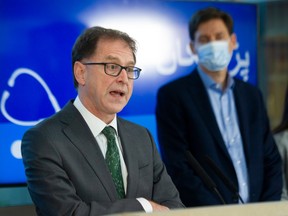Province will triple the number of internationally-trained doctors it accepts each years and create a new class associate physician class

The B.C. government is loosening restrictions on foreign-trained doctors in its latest bid to manage the family medicine crisis in the province.
On Sunday, B.C. Premier David Eby and Health Minister Adrian Dix revealed a string of moves aimed at getting offshore-trained doctors into the local medical system.
Start your day with a roundup of B.C.-focused news and opinion delivered straight to your inbox at 7 a.m., Monday to Friday.
Thanks for signing up!
A welcome email is on its way. If you don't see it, please check your junk folder.
The next issue of Sunrise presented by Vancouver Sun will soon be in your inbox.
The most significant was to increase the yearly intake of doctors through the Practice Ready Assessment Program from 32 to 96 over the next two years. This is the main path internationally-trained doctors must travel in order to be licensed in B.C.
The government will also allow internationally-trained doctors to start their accreditation process before they arrive in the province.
Meanwhile, internationally-trained doctors not eligible for the Practice Ready Assessment Program will be directed to a new program allowing them to become associate physicians – a new licence that will be governed by the College of Physicians and Surgeons of B.C.
“This will allow them to care for patients under the direction and supervision of an attending physician within a health authority acute-care setting,” Eby said.
The College of Physicians and Surgeons of B.C. will also change its rules to allow doctors trained in the U.S. for three years to practise medicine in urgent and primary care centres, community facilities and family practices.
Dix says the tripling of seats in the Practice Ready program alongside the other measures represents a “significant change.”
He said the announcement was part of B.C.’s Health Human Resources Strategy announced in September. An estimated 20 per cent of B.C.’s population does not have a family doctor and instead rely on drop-in clinics and community care centres.
The new strategy includes a revised payment model for B.C. doctors that makes them among the highest paid in Canada.
The new payment model, negotiated between the province and physician advocacy groups Doctors of B.C. and B.C. Family Doctors, means a full-time family physician working 1,680 hours a year, who sees 1,250 patients with cases of average complexity and has 5,000 visits from patients a year, will earn at least $385,000.
Figures provided by the Ministry of Health Monday showed the average salary for a full-time family physician in B.C. in 2020-21 was $250,000.
Instead of being paid $30 to $40 per visit regardless of the severity of a patient’s problem, family doctors will be paid based on time spent with patients, the number of patients seen in a day, the number of patients attached to their practice, the complexity of the patient’s issues, and their office overhead costs.
The new payment model for family doctors – which takes effect in February – also gets rid of the current patient cap, which only pays doctors a full fee for 50 patients a day. Doctors who see more than 50 patients in a day only receive partial payment for subsequent visits.
There are approximately 4,120 family physicians in B.C. who self-identified as providing longitudinal care, according to the health ministry.
At the beginning of Nov. 3,164 of those family doctors received $25,000 for overhead costs
In June, the B.C. government announced it would offer 175 new family practice resident graduates lucrative contracts, a $25,000 signing bonus as well as a phased medical training debt-forgiveness plan — up to $50,000 for the first year and up to $20,000 in medical training debt forgiveness for each year of two through five.
The government is also funding more seats in the UBC medical program.


